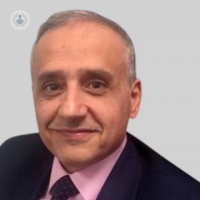Understanding coronary angiogram
Written by:Coronary angiogram is a procedure which offers a vital window into the heart’s blood supply. A cornerstone in the diagnosis of a number of heart conditions, coronary angiogram is commonly used to ensure any cardiac problems can be effectively treated. To learn more, we invited esteemed consultant cardiologist Dr Mohamed Al-Obaidi to share his expert insight on what the procedure entails.

What is a coronary angiogram?
A coronary angiogram is a crucial procedure for checking how well blood flows through the heart's arteries. During this test, a special dye (contrast) is put into the blood vessels while taking X-ray images (fluoroscopy) from different angles. This helps cardiology consultants see, in real-time, how blood is getting to the heart muscle (myocardium).
How is a coronary angiogram performed?
To perform a coronary angiogram, the doctor needs to access an artery. They usually use one in your wrist (the radial artery) or the upper leg (the femoral artery).
As a first step, the practitioner will give you a shot of local anaesthesia under your skin. It might sting for a moment but it will numb the area so you won't feel much during the procedure. Once the area is numb, a small tube is inserted into the artery. Through this tube, smaller tubes (catheters) are introduced which reach the heart and administer the dye.
Are patients awake during a coronary angiogram?
Usually, patients stay awake while a coronary angiogram is performed. However, if you're nervous or uncomfortable, your doctor can administer sedation to make you feel more relaxed.
What are the next steps following a coronary angiogram?
After undergoing the procedure, the next steps depend on the findings. Your cardiologist will analyse the results and discuss treatment options with you, which might include angioplasty and stenting to address any blockages.
Medications to manage risk factors, lifestyle changes, and regular follow-up appointments are typically part of the treatment plan for most patients. Cardiac rehabilitation may be recommended for recovery and long-term monitoring ensures ongoing heart health.
Your healthcare practitioner will provide support and key information to help you understand and manage your heart condition effectively in your individual case. However, regular check-ups and a heart-healthy lifestyle is essential for every patient’s long-term wellbeing.
If you are concerned about your heart health and wish to schedule a consultation with Dr Al-Obaidi, visit his Top Doctors profile.


